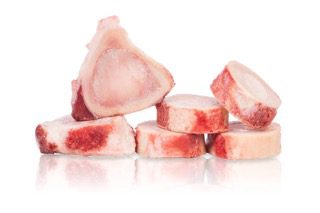

Beef bones, also known as marrow bones, are a nutritious and tasty treat for dogs. These bones are rich in calcium, chondroitin, glucosamine, and phosphorous, which help promote healthy bones, teeth, and joints in dogs. Originating from cows, beef bones can be sourced from organic or grass-fed livestock and are widely available at most supermarkets and pet stores.
Beef bones are an excellent source of easily absorbed calcium that promotes healthy bones and teeth in dogs. The bones also contain phosphorous, chondroitin sulfates, and glucosamine, which support joint health and mobility. Chewing on beef bones stimulates saliva enzymes that prevent plaque buildup and clean teeth, gums, and the digestive tract. Beef bones can also help maintain a regular potty schedule and prevent boredom and destructive chewing.
Cooked bones are not safe for dogs as they can splinter easily. Raw beef bones may cause tooth injuries, especially in puppies.
It is best to source beef bones from organic or grass-fed livestock. Dogs can consume raw or freeze-dried beef bones, but if their diet already has complete calcium, limit edible bones or only feed them as occasional treats. Raw beef marrow bones provide the most nutrition, and chewing should only last for 10-15 minutes. Bones with marrow left can be refrigerated and given again the next day. Beef bones can also be used to make bone broth, which is highly nutritious. Always supervise your dog when feeding bones and remove the bones after their eating session.
Dogs can consume beef bones and benefit from the nutrients they offer. The bones contain calcium, chondroitin, glucosamine, and phosphorous, which promote joint health and protect against debilitation. Additionally, chewing on beef bones can keep dogs occupied and prevent destructive chewing.
Although raw or freeze-dried bones are safe for dogs to eat, it's important to supervise their chewing to prevent tooth injuries, especially in puppies. Cooked bones, on the other hand, can splinter easily and pose a choking hazard, making them unsafe for dogs to eat. While chewing beef bones can provide several benefits for dogs like maintaining a proper potty schedule and preventing destructive chewing, owners should make sure their dog's diet already has complete calcium and limit edible bones or feed them occasionally as treats.
If you're looking for alternatives to beef bones, bully sticks or antlers are great alternatives. Bully sticks are protein-rich and easy to digest while antlers can provide hours of entertainment while scraping away tartar and plaque.
Have you tried giving your dog beef bones? What was your experience? Let's chat in the comments!
Remember, always supervise your dog when eating bones and remove them after their chewing session is over. Treat your furry best friend to a healthy treat today!